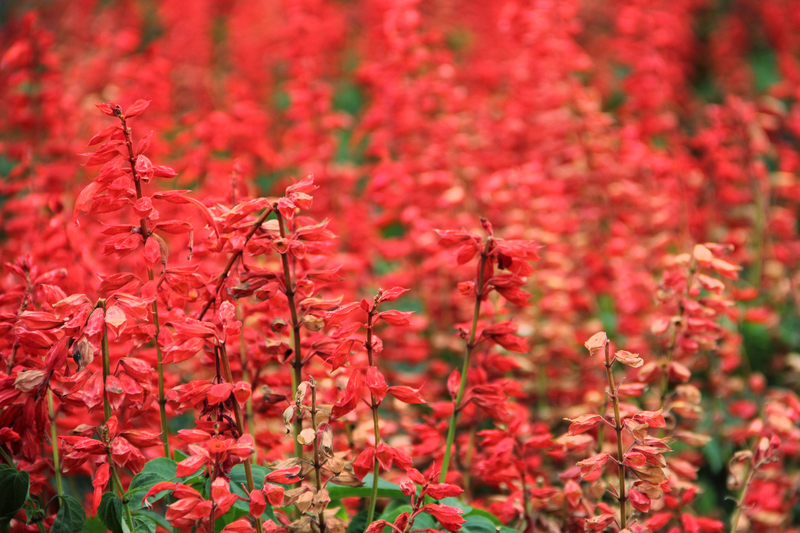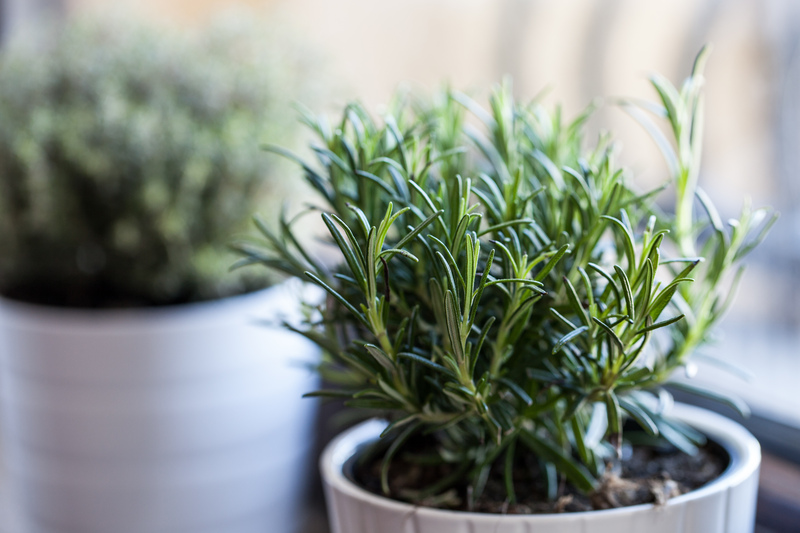Revitalize Your Cooking with Herbs from Your Garden
Posted on 10/09/2025
Revitalize Your Cooking with Herbs from Your Garden
Are you ready to boost the flavor and nutrition of your meals? Imagine stepping outside, snipping fresh herbs straight from your garden, and transforming your cooking into a vibrant culinary experience. Discover how you can revitalize your cooking with garden herbs, adding freshness, color, and incredible taste to everything you prepare.
Why Use Fresh Herbs from Your Own Garden?
Herbs are some of the most versatile, easy-to-grow, and rewarding plants you can have. When you incorporate freshly picked herbs from your own garden into your cooking, you're not just enhancing flavor—you're also adding valuable nutrients and health benefits to your meals.
Benefits of Using Homegrown Herbs
- Superior Freshness: Herbs lose their flavor and nutrients quickly after harvest. Picking them right before use brings unmatched freshness and aroma to your dishes.
- Richer Nutritional Value: Fresh herbs like parsley, basil, and cilantro are loaded with vitamins K, A, and C, antioxidants, and other micronutrients.
- Cost-Effective: Growing your own herbs eliminates the need to buy expensive bunches from the store, many of which go bad quickly.
- Eco-Friendly: Home gardening means zero packaging waste and minimal transportation footprints.
- Personal Satisfaction: There is a particular joy in harvesting what you've personally nurtured and elevating your cuisine with it.

Getting Started: Growing Your Culinary Herb Garden
You don't need a large backyard to grow culinary herbs. Many thrive in pots on balconies, window sills, or small raised beds. Here are some popular garden herbs to get you started:
- Basil – Essential for Italian and Southeast Asian dishes.
- Parsley – Universal garnish and flavor boost, great in salads and soups.
- Thyme – Pairs well with roasted meats, vegetables, and in stews.
- Rosemary – Robust and aromatic; perfect for grilling and baking.
- Mint – Refreshing in desserts, teas, and Middle Eastern cuisine.
- Cilantro – Key ingredient in Mexican, Indian, and Asian recipes.
- Dill – Brightens up potatoes, fish, and pickles.
- Oregano – Adds a Mediterranean twist to pizza, sauces, and salads.
Easy Steps to Cultivate Herbs
- Select the Right Location: Most herbs need at least 6 hours of sunlight daily. A sunny windowsill or a bright corner in your yard is perfect.
- Use Quality Soil: Well-draining, fertile soil ensures your herbs grow robust and healthy.
- Water Appropriately: Keep the soil moist but not waterlogged. Overwatering can cause root rot.
- Harvest Regularly: Snip the tips of your herbs often to encourage bushier growth and prevent flowering.
- Feed Your Herbs: Once a month, use an organic fertilizer to provide extra nutrition.
How Fresh Garden Herbs Transform Everyday Cooking
When you revitalize your cooking with herbs from your own garden, everything changes. You experience new flavors, appealing visuals, and enhanced nutritional value with every meal. Here's how introducing fresh garden herbs can revolutionize your dishes:
Flavor Amplification
Fresh herbs offer a burst of flavor that's hard to match with dried herbs. For example:
- Basil in a Caprese salad brings out the sweetness of tomatoes and mozzarella.
- Rosemary on roasted potatoes adds a piney, earthy depth.
- Cilantro garnish on tacos and curries introduces a bright, citrusy lift.
Color and Presentation
Herbs add vivid color and attractive garnish to even simple meals:
- Chopped parsley or chives over scrambled eggs or soups.
- Mint leaves as a delightful finish for desserts or beverages.
Health Benefits
Many fresh herbs are regarded as superfoods due to their concentrated phytonutrients:
- Parsley supports kidney function and fights inflammation.
- Basil contains antioxidants that combat cell damage.
- Mint aids in digestion and relieves headaches.
Creative Ways to Use Garden Herbs in Your Cooking
There's no end to the delicious possibilities when you have a steady supply of homegrown herbs. You can revitalize classic recipes, invent new favorites, or simply brighten up leftovers. Here are some top ideas:
Infuse Flavor into Oils and Vinegars
Herb-infused oils and vinegars can elevate your dressings, marinades, and sauces. Try steeping sprigs of rosemary, oregano, or thyme in olive oil for a week. For flavored vinegar, heat vinegar slightly and add basil or tarragon--let it steep for a few days.
Blend Into Pestos and Sauces
- Basil Pesto: Blend basil, pine nuts, garlic, Parmesan, and olive oil into a vibrant sauce for pasta or sandwiches.
- Cilantro Sauce: Puree cilantro, lime juice, jalapeno, and yogurt for a zesty topping.
- Chimichurri: Chop parsley, oregano, garlic, vinegar, and oil for a classic Argentinian steak sauce.
Add Freshness to Salads and Sides
Instead of lettuce-only salads, toss in handfuls of chopped dill, tarragon, or mint. Mix herbs into slaws, quinoa, couscous, or potato salads for extra dimension.
Boost Main Dishes
- Herb Rubs: Combine chopped rosemary, thyme, and sage with salt and pepper--rub on meats before grilling or roasting.
- Stir-ins: Add freshly chopped herbs to finish soups, risottos, and pastas for instant brightness and complexity.
Create Herbal Drinks and Desserts
- Mint Lemonade: Muddle fresh mint leaves in lemonade or cocktails for a cooling effect.
- Herbal Teas: Steep sage, lemon balm, or chamomile straight from your garden for soothing teas.
- Basil or Lavender Syrup: Make simple syrups for desserts, cakes, or ice cream with fresh herbs and sugar.
Perfect Pairings: Which Herbs Go with What?
One of the keys to herb-enhanced cooking is learning which flavors complement each other and your favorite dishes. Here are some classic pairings:
- Basil > Tomatoes, mozzarella, olive oil, pasta.
- Rosemary > Potatoes, poultry, lamb, bread.
- Sage > Pork, veal, poultry, butternut squash.
- Thyme > Beef, fish, stews, roasted vegetables.
- Dill > Fish, eggs, cucumbers, yogurt sauces.
- Mint > Peas, lamb, chocolate, fruit desserts.
- Oregano > Pizza, roasted vegetables, beans, Greek cheese.
- Cilantro > Tacos, curries, salsas, rice dishes.
General Tips for Using Fresh Herbs
- Add Delicate Herbs at the End: Herbs like basil, parsley, and cilantro should be added just before serving to preserve their aroma and vibrant color.
- Add Woody Herbs Early: Herbs such as rosemary, thyme, and sage benefit from longer cooking, releasing flavors gradually.
- Chop Right Before Use: Maximum essential oils and flavors are preserved if you chop herbs just before adding them to your dishes.
Preserving the Harvest: Making Your Herbs Last
If your garden is thriving, you might end up with more herbs than you can immediately use. Here's how to enjoy their benefits year-round:
Freezing
- Chop herbs and freeze in ice cube trays with a bit of water or olive oil. Pop cubes directly into soups, stews, and sauces as needed.
- Basil, cilantro, and parsley freeze particularly well using this method.
Drying
- Hang small bunches of sturdy herbs like rosemary, thyme, and oregano upside down in a dry, well-ventilated area.
- Once dry, crumble and store in airtight containers away from light and heat.
Herbal Vinegars, Butters, and Salts
- Infuse vinegar with your favorite herbs for salad dressings.
- Mix softened butter with chopped herbs and freeze for instant flavor boosters for bread, corn, or pasta.
- Blend herbs and sea salt for unique finishing salts.

Common Questions about Cooking with Garden Herbs
Can I Substitute Fresh Herbs for Dried, and Vice Versa?
Yes! The general rule is: 1 tablespoon fresh herbs equals 1 teaspoon dried. Remember, dried herbs are more concentrated, so use less.
How Can I Avoid Bitter Flavors?
Using too much of strong herbs like rosemary or sage can make dishes taste bitter. Start with small amounts, taste as you go, and combine with milder herbs for balance.
My Herbs Are Flowering—Can I Still Use Them?
Once herbs flower, their leaves may turn bitter. Pinch off flower buds to encourage continued leaf growth and keep herbs sweeter for longer harvests.
Can I Grow Herbs Indoors Year-Round?
Absolutely! With a sunny window or grow light, you can revitalize your cooking with fresh herbs even in winter.
Conclusion: Savor the Joy of Garden-to-Table Cooking
By cultivating herbs in your own garden, you can revitalize your cooking with endless variety, nutrition, and delectable flavors. Whether you're an experienced chef or a home cook, the possibilities are truly endless. Start small, experiment boldly, and enjoy the transformation of every meal from ordinary to extraordinary with the magic of homegrown herbs.
Ready to take the first step? Plant your favorite herbs today and enjoy the vibrant, healthy, and flavorful rewards in every dish you create!
Latest Posts
Innovative Ideas to Shield Your Garden from Weather Threats
Foster nature's beauty with orchid knowledge
Hedge Artistry: Perfect Shapes and Techniques for Every Gardener

